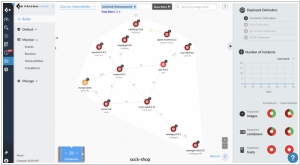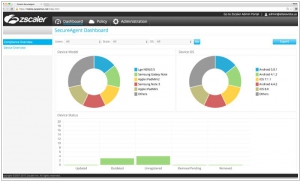Palo Alto Prisma vs Zscaler
August 04, 2023 | Author: Michael Stromann
Palo Alto Prisma and Zscaler are two different cloud-based security solutions that provide network security, cloud security, and other cybersecurity features. Here are the main differences between Palo Alto Prisma and Zscaler:
Approach to Security: Palo Alto Prisma is a cloud security platform that offers a comprehensive suite of security services, including cloud access security broker (CASB), secure web gateway (SWG), and zero trust network access (ZTNA), among others. It focuses on securing applications, data, and users across multi-cloud environments. Zscaler, on the other hand, is a cloud security platform that provides a cloud-delivered security stack, including secure web gateway (SWG), cloud firewall, cloud sandboxing, and other security services. It is designed to provide security for internet-bound traffic from any location or device.
Deployment Model: Palo Alto Prisma offers a hybrid deployment model, allowing organizations to deploy security services in the cloud, on-premises, or in a combination of both. This provides flexibility and allows organizations to maintain control over their security policies and data. Zscaler, on the other hand, is a fully cloud-native security platform that operates as a cloud service, meaning all traffic is routed through Zscaler's global network of data centers for inspection and enforcement.
Network Architecture: Palo Alto Prisma uses a hub-and-spoke network architecture, where traffic is backhauled to the nearest hub before being routed to the appropriate security services. This can result in added latency and backhaul costs for certain traffic flows. Zscaler, on the other hand, uses a direct-to-cloud architecture, where traffic is routed directly to the closest Zscaler data center for inspection and enforcement. This can result in lower latency and improved performance for internet-bound traffic.
Feature Set: Both Palo Alto Prisma and Zscaler offer a wide range of security features, but there may be differences in their specific capabilities, depending on the service bundle or subscription level. Organizations should carefully review the feature sets of both solutions to ensure they meet their specific security requirements.
Integration and Connectivity: Palo Alto Prisma integrates with other Palo Alto Networks products, such as Palo Alto Networks Next-Generation Firewalls (NGFWs) and Palo Alto Networks Panorama management platform. Zscaler, on the other hand, offers integration with various third-party security solutions, as well as cloud-based applications and services, through its extensive ecosystem of integrations.
Global Network and Coverage: Zscaler operates a global cloud security network with multiple data centers strategically located around the world, providing coverage for internet-bound traffic from any location. Palo Alto Prisma also operates data centers in multiple regions, but the coverage may vary depending on the specific service and deployment model.
Pricing and Licensing: Pricing and licensing models for Palo Alto Prisma and Zscaler may differ, and it's important to review the details of their pricing and licensing offerings to determine which one aligns with your budget and requirements.
In summary, Palo Alto Prisma and Zscaler are both cloud-based security solutions, but they differ in their approach to security, deployment model, network architecture, feature set, integration and connectivity, global network and coverage, and pricing and licensing. Organizations should evaluate their specific security requirements and consider factors such as deployment model, network architecture, feature set, integration options, global network coverage, and pricing to determine which solution best meets their cybersecurity needs.
See also: Top 10 Cloud Security Software
Approach to Security: Palo Alto Prisma is a cloud security platform that offers a comprehensive suite of security services, including cloud access security broker (CASB), secure web gateway (SWG), and zero trust network access (ZTNA), among others. It focuses on securing applications, data, and users across multi-cloud environments. Zscaler, on the other hand, is a cloud security platform that provides a cloud-delivered security stack, including secure web gateway (SWG), cloud firewall, cloud sandboxing, and other security services. It is designed to provide security for internet-bound traffic from any location or device.
Deployment Model: Palo Alto Prisma offers a hybrid deployment model, allowing organizations to deploy security services in the cloud, on-premises, or in a combination of both. This provides flexibility and allows organizations to maintain control over their security policies and data. Zscaler, on the other hand, is a fully cloud-native security platform that operates as a cloud service, meaning all traffic is routed through Zscaler's global network of data centers for inspection and enforcement.
Network Architecture: Palo Alto Prisma uses a hub-and-spoke network architecture, where traffic is backhauled to the nearest hub before being routed to the appropriate security services. This can result in added latency and backhaul costs for certain traffic flows. Zscaler, on the other hand, uses a direct-to-cloud architecture, where traffic is routed directly to the closest Zscaler data center for inspection and enforcement. This can result in lower latency and improved performance for internet-bound traffic.
Feature Set: Both Palo Alto Prisma and Zscaler offer a wide range of security features, but there may be differences in their specific capabilities, depending on the service bundle or subscription level. Organizations should carefully review the feature sets of both solutions to ensure they meet their specific security requirements.
Integration and Connectivity: Palo Alto Prisma integrates with other Palo Alto Networks products, such as Palo Alto Networks Next-Generation Firewalls (NGFWs) and Palo Alto Networks Panorama management platform. Zscaler, on the other hand, offers integration with various third-party security solutions, as well as cloud-based applications and services, through its extensive ecosystem of integrations.
Global Network and Coverage: Zscaler operates a global cloud security network with multiple data centers strategically located around the world, providing coverage for internet-bound traffic from any location. Palo Alto Prisma also operates data centers in multiple regions, but the coverage may vary depending on the specific service and deployment model.
Pricing and Licensing: Pricing and licensing models for Palo Alto Prisma and Zscaler may differ, and it's important to review the details of their pricing and licensing offerings to determine which one aligns with your budget and requirements.
In summary, Palo Alto Prisma and Zscaler are both cloud-based security solutions, but they differ in their approach to security, deployment model, network architecture, feature set, integration and connectivity, global network and coverage, and pricing and licensing. Organizations should evaluate their specific security requirements and consider factors such as deployment model, network architecture, feature set, integration options, global network coverage, and pricing to determine which solution best meets their cybersecurity needs.
See also: Top 10 Cloud Security Software
Palo Alto Prisma vs Zscaler in our news:
2024. Zscaler buys Avalor to bring AI risk management into its security tools
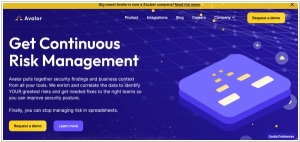
Cloud security firm Zscaler has completed its acquisition of cybersecurity startup Avalor for $310 million, aiming to enhance its platform with a range of new capabilities including streamlined security incident reporting, incident mitigation, asset discovery, data classification, and security policy generation. Avalor serves as a central repository for cybersecurity assets, controls, identities, vulnerabilities, bugs, and various data points, enabling security teams to aggregate, normalize, de-duplicate, and track risk data from discovery to remediation. While similar startups like Securiti and Dig Security address comparable challenges, Avalor stands out for its versatility in handling data from diverse sources and formats, along with its unique suite of vulnerability risk management and prioritization tools.
2023. Palo Alto has acquired secure browser Talon
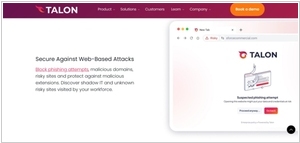
Palo Alto Networks has acquired Israely startup Talon Cyber Security for $625 million. Talon Cyber Security specializes in developing enterprise browsers tailored to secure distributed workforces. Their technology allows organizations to safeguard work-related activities without interfering with personal device usage or compromising user privacy. By integrating Talon's solutions with Prisma SASE, Palo Alto Networks aims to establish a secure connection for all users and devices, ensuring consistent security across various applications, including private ones, regardless of the user's identity or the device they use for work.
2023. Palo Alto Networks buys Dig Security for $400M
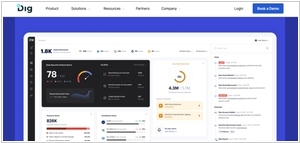
Palo Alto Networks has announced its acquisition of Dig, an Israeli startup specializing in data security posture management (DSPM). Dig's expertise lies in helping organizations comprehend the whereabouts of their assets across various cloud environments, aiding security teams in understanding data movement and identifying areas that require enhanced security measures in the event of a breach. Following the acquisition, Dig's tools will be integrated into Palo Alto Prisma, which is dedicated to cloud security. This integration aims to empower customers by providing effective management of security for their diverse data repositories in contemporary cloud applications, thereby minimizing the risk of data breaches.
2020. Palo Alto Networks to buy digital forensics consulting firm for $265M
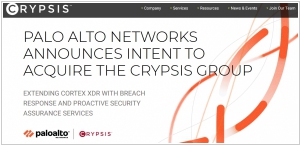
Security software provider Palo Alto Networks has recently completed the acquisition of The Crypsis Group, a reputable consulting firm specializing in incident response, risk management, and digital forensics. The acquisition comes with a significant price tag of $265 million. While Palo Alto Networks offers a range of tools aimed at preventing attacks, it is crucial to acknowledge that no set of tools can guarantee absolute security. The ongoing battle between companies like Palo Alto and attackers revolves around a cat-and-mouse game. Crypsis Group plays a vital role in post-breach analysis, helping identify the root causes of breaches and fortifying vulnerable areas to prevent future unauthorized access through specific weak points in the system's architecture.
2020. Palo Alto Networks to acquire CloudGenix for $420M
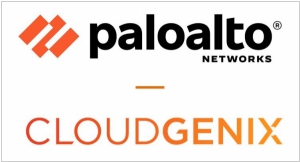
Palo Alto Networks has completed the acquisition of CloudGenix for a total of $420 million. CloudGenix specializes in providing a software-defined wide area network (SD-WAN) solution, enabling customers to enhance security by implementing policy enforcement to ensure compliance with company security protocols across various distributed locations. This capability proves particularly beneficial for organizations with numerous branch offices or a widely dispersed workforce, a scenario that has become increasingly prevalent as millions of individuals abruptly transition to remote work arrangements.
2015. Cloud security service Zscaler raised $100 million

Security platform Zscaler, renowned for its extensive range of web, mobile, and cloud security services for enterprises, has recently secured an impressive $100 million in Series B funding, resulting in a valuation exceeding $1 billion. The company proudly announces that its customer base has doubled in the past year, surpassing 5,000 clients. Notable organizations such as Humana, NBC, ExxonMobil, and the UK's National Health Services are among Zscaler's esteemed customers. Currently, Zscaler safeguards over 13 million employees. Zscaler's technology acts as a middle layer between corporate networks (including user mobile devices) and the cloud, irrespective of whether it's a cloud computing service like AWS or Azure, a privately hosted OpenStack cloud, or cloud-based applications like Dropbox and Office 365. By thoroughly inspecting all traffic to these services originating from company-owned devices and networks, Zscaler provides comprehensive security and compliance solutions.

